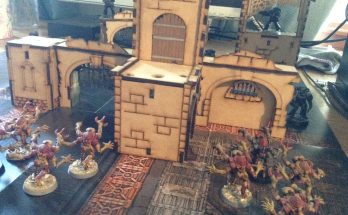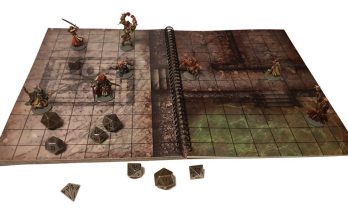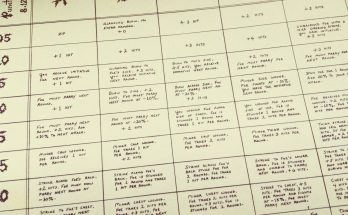One of my resolutions was not to talk about Fifth Edition D&D until I had it in my cold grubby hands. But… c’mon! It’s been announced today (check out EN World for coverage)! How can I possibly keep quiet?
Not gonna happen. Resolution, broken.
Three words get me excited about 5e D&D more than any others. These are “open playtest” and “modular”. Let’s take ’em one at a time. Or rather, two at a time, then one. You know what I mean. Shut up at the back.
Open Playtest
One problem (in fact, quite possibly the only problem) with Fourth Edition D&D was that it was extensively playtested in-house, which is not the same as extensively playtested, period. It quickly became apparent that certain elements of the rules (Skill Challenges, naming just one) just didn’t get the playtest treatment they deserved, and that gave rise to a mentality where it was acceptable (desirable, even) to continually update and errata the system after the event. Having an open playtest across as wide a group as possible should mean that the vast majority of game issues will be resolved before it sees print. This is how it should be, both at launch and for any further supplements down the line.
One of the joys of D&D is that it should support a wide range of play-styles, from immersive story-telling to intensive all-or-nothing combat, from low-level urban adventures to wild battles across the planes, and anything in-between. Having an open playtest ensures that divergent groups can help contribute to D&D and ensure that their particular play-style is well represented by the rules. Whether they want a fast-and-light low-rules retro feel or a multitude of feats, powers and meta-game options, D&D should cater for them.
Sounds impossible? That leads us to…..
Modular
Picture an edition of D&D where the base rules are incredibly light – say, four Races and four Classes, rules for Hit Points, Armour Class & Damage and that’s it. This is clean, fast D&D in the style of the Pathfinder Beginner’s box, or early Classic D&D.
Everything else is a Lever (my terminology, not theirs).
Want Skills? Pull the Lever.
Want Feats? Powers? Backgrounds and Themes? Mass Combat? Strongholds? Planar Travel? Psionics? Anthorpomorphic races? Wushu Martial Arts?
All Levers.
A campaign setting could have its own Campaign Character Sheet where the GM can choose what Levers are pulled. Hand that to the players and they know how to build they character in accordance with the GM’s vision for the setting. If you want to run the Forgotten Realms as a rules-light retro D&D setting and another GM half-way across the country is playing it as an urban Wushu Martial Arts, it’s all cool, and it’s all D&D, baby. And the rules should support that.
Supplements could add new Levers (Psionics, for example) or expand existing ones, and published Adventures could state what default Levers it’s designed for, and provide suggestions how to use it for other Levers (“If you are using the Mass Combat option, add a further 1d1000 Orcs in Room 1”).
Fifth Edition D&D will be modular. The control of the game is back in the hands of the DM.
Amen to that.
One thing I hope they also plan is to do away with the ghastly Striker, Leader, Defender, etc terminology. Create decent Class Tree starting with Fighter, Cleric, Rogue, Wizard and put the classes in some kind of genealogy under that (Fighter+ Cleric = Paladin, Fighter + Wizard = Swordmage, Cleric + Rogue = cool class we’ve not seen yet, etc).
That’s what I hope, anyhow.
Time will tell. And these are exciting times indeed.
Game on!




nine whole days, i’m impressed. =)
i’m looking forward to see how the process plays out, and what wizards ends up doing when their feedback system provides at least ten radically different directions.
> nine whole days, i’m impressed. =)
It’s a personal best! :D
That’s where I’m hoping the modular design comes in. Done well, it will be awesome.
One of the many questions I’m wondering about it how the “levers” will affect the experience from one table to the next. I wonder if they won’t go back to the old “Basic” and “Advanced” tiers of yore, and then add more “levers” from there.
The “levers” concept reminds me of the TSR splat books. As I recall that wasn’t the best move for TSR from a sales standpoint, and may divide rather than unite the D&D audience. We’ll see.
The problem with “Basic” and “Advanced” tiered play was exactly that – it was tiered. Being able to mix and match rules elements to suit your preferred style of play (and actively encouraging and supporting that in the rules) is a far better solution. If your group or campaign setting wants (for example) more complex combat options then they should be usable without having to move en masse to the “Advanced” game. Modular design ftw.
The problem with the old TSR splat books were many and varied. One problem was balance. They provided options that made characters which used them substantially more powerful than their counterparts. This is a lesson that (hopefully!) by now D&D game designers have learned to avoid. 4e is pretty good in this respect, and I hope 5e follows suit.
Moving from one table to another (or even one compaign setting to another in the same group, if the settings are widely different) will involve a small degree of learning the new Levers, yes. Provided the rules are internally consistent though, that should be less of a problem than, say, changine rules system, and even that isn’t all that difficult.
One of the places where ‘levers’ worked best was Mutants and Masterminds 2nd edition. The Mastermind’s Manual was just one big book of levers. Most people didn’t use them, but they were there and they were official. On the Atomic Think Tank you would see a lot of people say, “I like the game, but it doesn’t do X which I like.” More often than not, someone would point to the Mastermind’s Manual and say “Pull levers A, B, and F”. Usually the complainer would say “Oh.” and wander off to either play or complain elsewhere.
Absolutely! I’ll be writing about Levers and multiple layers of complexity at the gaming table, using Mutants & Masterminds as an example, later this week.
Why would they do this? Most of us already own all of these levers in the older editions and are more than capable of doing the work ourselves. Most have done the work already. They are desperate and reaching.
> Why would they do this?
1) Because it’s a game they love and they want to see it have a future
2) Because they’re a company and making new stuff is what companies do
3) Because some people didn’t like Fourth Edition so they are genuinely trying to address their concerns
> Most of us already own all of these levers in the older editions and are more than capable of doing the work ourselves.
This is true. There are many people out there who are capable of doing the work themselves. Have they done this? No.
Besides, there’s a world of difference between Joe Q Gamer doing it, and the official makers of Dungeons & Dragons doing it and offering it to everyone else as a core element in the product line.
> Most have done the work already.
Not in my experience. D&D Editions tend to be polarized. Classic D&D gamers play Classic D&D, AD&D gamers play AD&D, 3e gamers play 3e and 4e gamers play 4e. You won’t find many gamers who play (for example) Third Edition D&D with Fourth Edition classes and AD&D monsters. The next edition of D&D looks like it will allow that degree of flexibility.
> They are desperate and reaching.
That’s just being pointlessly negative and critical for no good reason. If you don’t support the future of the hobby then save your complaints for other parts of the internet where I don’t go (*cough* grognard forums *cough*).
Thanks!
This is the first edition of my favorite game that I simply do not care about in the least. WotC has lost a customer for life. They burn the last bridge that joined us with 4E. I hope folks enjoy their new game.
I cannot help, after reading all of this and the comments, sitting with a copies of M&M on my shelf and go, “I got your fifth edition. . . right there. . .”
I’m coming a little late to this thread, but I don’t want the “Levers” to make characters more powerful than those without. Maybe more focused in a particular area, but not “better” overall. One player shouldn’t be penalized because he is just using the basic game, while another player is adding Feats and Skills.
(Or for that matter, because a third character wants to have all his HP healed up and almost all of his spells/powers ready to go after catching his breath for five minutes between fights).